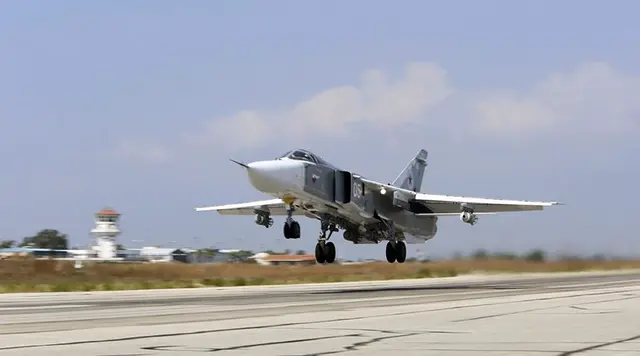The international coalition against terrorist groups like Daesh, also known as the Islamic State the terrorist group, should involve coordinated operations of ground military and air strikes, Russian Foreign Minister Sergei Lavrov said Wednesday.
While castigating Daesh for its "misanthropic ideals," Lavrov stressed that terrorism should be regarded as "the absolute enemies of humanity," according to an online transcript released by the Foreign Ministry.
"We are confident that it is possible to join forces against them," Lavrov said in an interview with Italian media ahead of his visit to Rome, Italy, scheduled for Dec. 10-11.
"Air power is sufficient, if you add up the capacity of the U.S. -led coalition and those of the Russian Federation, and, in the case of establishing a clear interaction with the ground forces, I believe the problem of IS can be solved fast enough," said Lavrov.
Noting that the joint ground forces could include Syrian government troops as well as opposition forces, Lavrov said the Syrian government would agree to cooperate with the U.S.-led coalition, if received such a request.
Considering the case of joint strikes against terrorists in Iraq, the same approach needed to be applied to Syria, according to him.
"There is every reason to believe that the Syrian leadership will cooperate with foreign partners," Lavrov said, stressing military operations are legitimate only based on international laws and agreed by Syrian government.
The U.S.-led international coalition has been conducting airstrikes in Syria without the approval of Damascus, as its members have insisted on ouster of the country's president Bashar al-Assad from the political settlement process in the war-torn country.
Russia started on Sept. 30 its own strikes against Daesh and other terrorist groups in Syria following a request by Assad.
According to Lavrov, Russia, Iran, Iraq and Syria had created a joint information center in the Iraqi capital Bagdad to coordinate actions in Syria.
Another such center set up in Amman, the capital of Jordan, can be used as a contact point between the U.S.-led coalition and Russia, he suggested.
The Russian minister also stressed that although compromises were made to some degree by relevant sides, it is illegal to set a deadline for Assad to step down.
"We believe that this kind of approach is artificial and in conflict with international law and the rules of democracy," Lavrov said.
The minister warned that the preconditions set for the creation of international anti-terror coalition would give chances for Daesh to expand further.
The most important thing currently is the struggle against terrorists, Lavrov said, who also accused Turkey of the downing of Russian warplane on Nov. 24, which according to Ankara was defensive action against airspace violation.
"We cannot explain it in any way other than the desire to either disrupt the anti-terrorist efforts or make them less effective, or to make Russia stop operations in the Syrian airspace, maybe even disrupt the political process that is currently taking shape on the basis of the Vienna agreements," he said.
Parties met in the previous two rounds of meetings, held in Vienna of Austria in late October and mid-November, to seek a roadmap to end the nearly five-year war in Syria that has killed 250,000 and triggered a refugee crisis in Middle East and Europe. The next round is tentatively scheduled for Dec. 18.
UN special envoy to Syria, Staffan de Mistura, said earlier in the day that Russia, the United States and the United Nations will hold three-way talks on the Syria crisis in Geneva, Switzerland, Friday, as part of preparatory work for future Vienna meetings. Enditem
 简体中文
简体中文

